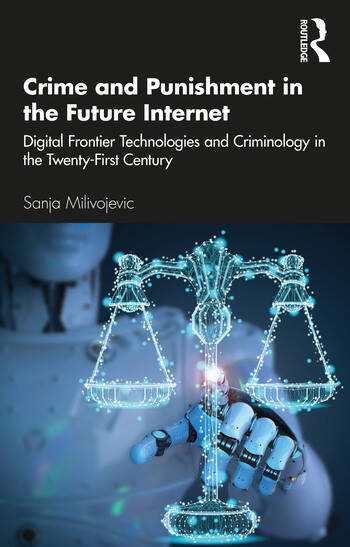Book Launch: Crime and Punishment in the Future Internet: Digital Frontier Technologies and Criminology in the 21st Century

Author's bio:
Dr Sanja Milivojevic is Associate Professor in Digital Futures at University of Bristol’s Digital Futures Institute. She is also Associate Director of Border Criminologies and Research Associate at Oxford University, as well as Honorary Research Fellow in Criminology at La Trobe University, Melbourne. Sanja holds LL.B. and LL.M. from Belgrade University’s Law School, Serbia, and a PhD from Monash University, Australia. Her research interests are borders, mobility, human trafficking, modern slavery, security technologies, surveillance, gender and victimisation, and international criminal justice and human rights. Sanja is a recipient of Australian and international research grants and was NSW representative at the Australian and New Zealand Society of Criminology’s Committee of Management. She was a visiting scholar at Oxford University, University of Oslo, University of Belgrade, and the University of Zagreb, as well as a Public Interest Law Fellow at Columbia University’s Law School in New York. Sanja has published six books and over 60 publications in English and Serbian. Her latest book, Crime and punishment in the future Internet: Digital frontier technologies and criminology in the twenty-first century, is published by Routledge (2021).
Discussants:
- Jef Huysmans is Professor of International Politics in the School of Politics and International Relations at Queen Mary, University of London. He co-convenes the research cluster Doing International Political Sociology. He is best known for his work on the politics of insecurity, the securitization of migration, critical methods, and international political sociology. Currently he is working on an international political sociology of fracturing worlds and motioning the politics of (in)security.
- Dr Silvia Milano is a Lecturer in Philosophy of Data and Data Ethics at the University of Exeter, and a research affiliate at the Future of Humanity Institute and in the Governance of Emerging Technologies (GET) research programme at the Oxford Internet Institute. Her research investigates epistemological and ethical issues relating to emerging technologies and AI, especially in algorithmic profiling and recommender systems.
- Dr Emre Korkmaz is a Departmental Lecturer in Migration and Development at the ODID, where he teaches on the MSc in Migration Studies. From October 2016 to September 2018, he was a British Academy Newton International Fellow/postdoctoral researcher at ODID. He was also a junior research fellow at St Edmund Hall (2017-20) and a Research Associate at the Centre for Technology and Global Affairs of the Department of Politics and International Relations (2018-20). Dr Korkmaz was awarded his PhD by Istanbul University’s International Relations PhD Programme in June 2016. He completed the Postgraduate Certificate in Teaching and Learning in Higher Education at the University of Oxford’s Centre for Teaching and Learning in May 2020. In recent years, he has been driven by a passion for examining the social and political impact of new digital and frontier technologies on migration. Before his current studies on “new technologies and migration”, his established track record in research covered two thematic areas: the place, visibility and status of migrants in the public sphere, and the politics of industrial relations, focusing mainly on the sustainability policies of global corporations in global supply chains on the employment of refugees.
- Samuel Singler is a DPhil candidate and ESRC Grand Union Scholar at the Centre for Criminology, University of Oxford. Situated within the field of Border Criminology, his DPhil research aims to illuminate the effects of novel border security technologies on the global criminalization of migration. The project asks how and why security technologies diffuse across and through borders, how they shape contemporary ‘crimmigration’ policies, and how they are deployed and contested on the ground. Empirically his research focuses on the International Organization for Migration and its deployment of novel border control technologies in Nigeria. More broadly, his research interests lie in the politics of borders, migration, and citizenship.
Register for the event here.

